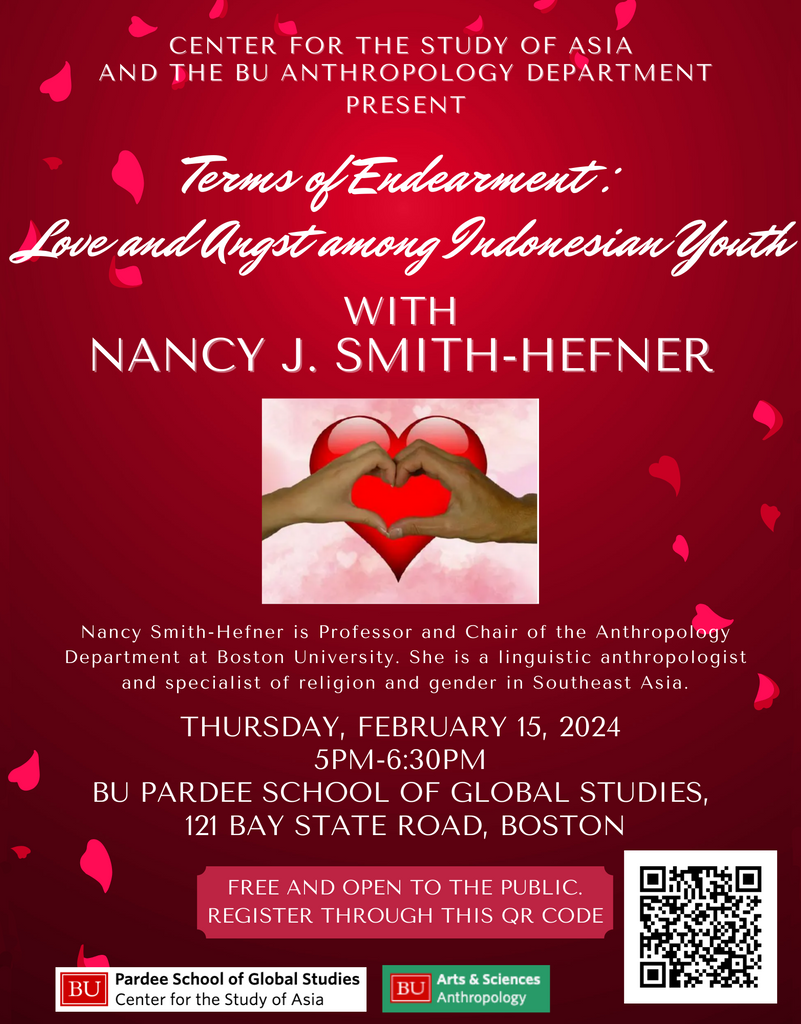Terms of Endearment: Love and Angst among Indonesian Youth, with Nancy J. Smith-Hefner (Feb. 15, 2024)
The BU Center for the Study of Asia and the Department of Anthropology are delighted to present
Nancy J. Smith-Hefner
(Department of Anthropology, Boston University)
Terms of Endearment: Love and Angst among Indonesian Youth
Thursday, February 15, 2024 from 5:00 to 6:30 pm
at the Pardee School of Global Studies, 121 Bay State Road, Boston University

Abstract:
Since the early 2000s, a set of new terms and phrases dealing with affective subjectivity have become trendy within Indonesia’s growing middle class. These forms proliferate in the stories young people tell about their romantic relationships, as well as circulating widely in life-coaching seminars, the sermons of hip Muslim preachers, and on the book spines of best-selling self-help paperbacks in urban bookstores. Although some of these terms have long existed in Indonesian, they have taken on new prominence; others are borrowed from English but have been assigned rather different meanings. This paper explores several of the most interesting of these keywords: galau (a state of [particularly adolescent] confusion; angst), move on (especially, to leave a relationship behind), and hijrah (to move on to greater piety). The paper examines in particular the prominence and function of these newly popularized terms in discourses surrounding youth sociability and sexuality. Strikingly, these affective phrases have been pressed into service by ultra-conservative Islamist preachers like Felix Siauw and used to fan the flames of moral panic over youth immorality. Richards and Rudnyckyj’s (2009) notion of an “economy of affect” highlights the role of emotion in the practices through which people transform themselves into modern individuals capable of self-effectuation. In Indonesia, to be modern, young, and middle class is to be capable of new modes of emotional expression and affective flexibility, but such expressivity is viewed by many as threatening long held models of personhood.
About the speaker:
 Nancy J. Smith-Hefner is a linguistic anthropologist and specialist of religion and gender in Southeast Asia. Her early research included projects on language, identity, and gender socialization in Java, Indonesia, as well as identity and moral education among Cambodian refugees in the United States. Her current research is focused on questions of gender and sexuality among Muslim Javanese youth.
Nancy J. Smith-Hefner is a linguistic anthropologist and specialist of religion and gender in Southeast Asia. Her early research included projects on language, identity, and gender socialization in Java, Indonesia, as well as identity and moral education among Cambodian refugees in the United States. Her current research is focused on questions of gender and sexuality among Muslim Javanese youth.
Her 2019 book, Islamizing Intimacies: Youth, Sexuality, and Gender in Contemporary Indonesia (University of Hawai’i Press) traces recent trends and controversies in Muslim youth culture in Java. The book examines new practices of language, dress, courtship, and marriage in relation to public cultural debates on masculinities and femininities, the growing interest in more normative forms of Islam, and the development of new middle-class subjectivities. Rather than a unitary Muslim conformity, the study emphasizes the increasing pluralization of options for contemporary youth—and the contest to which the new gender diversity has given rise.
She is currently working on the completion of a short monograph on youth and romance in Indonesia. Chapters present a series of “experience-near” stories of romance as recounted by Javanese youth that reflect both the diversity of young people’s experiences but also the common scripts on which young people draw in framing their life narratives.
Dr. Smith-Hefner is the editor (with Marcia C. Inhorn) of Waithood: Gender, Education and Global Delays in Marriage (Berghahn Books, 2020) and author of Khmer American: Identity and Moral Education in a Diasporic Community (University of California Press, 1999). Her work has been supported by the National Endowment for the Humanities, the Spencer Foundation, the Social Science Research Council, and the Fulbright Senior Scholar Program.